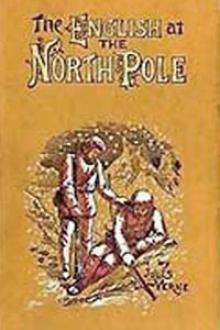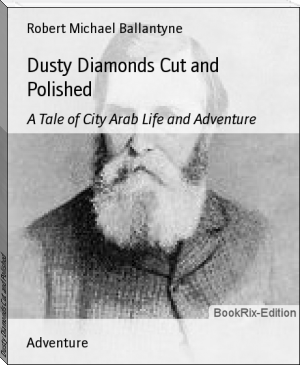The World of Ice - Robert Michael Ballantyne (best selling autobiographies TXT) 📗

- Author: Robert Michael Ballantyne
Book online «The World of Ice - Robert Michael Ballantyne (best selling autobiographies TXT) 📗». Author Robert Michael Ballantyne
"Here it is, sir," said the man, pulling out a glass of about six inches long, and handing it to Fred.
"How many is there, an ye plaze?"
"Six, I think; yes--one, two, three--I can't make them out quite, but I think there are six, besides the one on the ice. Hist! there he sees him. Ah, Meetuck, he's too quick for you."
As he spoke the seal on the ice began to show symptoms of alarm. Meetuck had approached to within shot, but he did not fire; the wary Esquimau had caught sight of another object which a lump of ice had hitherto concealed from view. This was no less a creature than a walrus, who chanced at that time to come up to take a gulp of fresh air and lave his shaggy front in the brine, before going down again to the depths of his ocean home. Meetuck, therefore, allowed the seal to glide quietly into the sea, and advanced towards this new object of attack. At length he took a steady aim through the hole in the canvas screen, and fired. Instantly the seals dived, and at the same time the water round the walrus was lashed into foam and tinged with red. It was evidently badly wounded, for had it been only slightly hurt it would probably have dived.
Meetuck immediately seized his harpoon, and rushed towards the struggling monster; while Fred grasped a gun and O'Riley a harpoon, and ran to his assistance. West remained to keep back the dogs. As Meetuck gained the edge of the ice the walrus recovered partially, and tried, with savage fury, to reach his assailant, who planted the harpoon deep in its breast, and held on to the rope while the animal dived.
"Whereabouts is he?" cried O'Riley, as he came panting to the scene of action.
As he spoke the walrus ascended almost under his nose, with a loud bellow, and the Irishman started back in terror, as he surveyed at close quarters, for the first time, the colossal and horrible countenance of this elephant of the Northern Seas. O'Riley was no coward, but the suddenness of the apparition was too much for him, and we need not wonder that in his haste he darted the harpoon far over the animal's head into the sea beyond. Neither need we feel surprised that when Fred took aim at its forehead, the sight of its broad muzzle fringed with a bristling moustache, and defended by huge tusks, caused him to miss it altogether. But O'Riley recovered, hauled his harpoon back, and succeeded in planting it deep under the creature's left flipper; and Fred, reloading, lodged a ball in its head, which finished it. With great labour the four men, aided by the dogs, drew it out upon the ice.
This was a great prize, for walrus-flesh is not much inferior to beef, and would be an acceptable addition of fresh meat for the use of the _Dolphin's_ crew; and there was no chance of it spoiling, for the frost was now severe enough to freeze every animal solid almost immediately after it was killed.
The body of this walrus was not less than eighteen feet long and eleven in circumference. It was more like an elephant in bulk and rotundity than any other creature. It partook very much of the form of a seal, having two large paw-like flippers, with which, when struggling for life, it had more than once nearly succeeded in getting upon the ice. Its upper face had a square, bluff aspect, and its broad muzzle and cheeks were completely covered by a coarse, quill-like beard of bristles, which gave to it a peculiarly ferocious appearance. The notion that the walrus resembles man is very much overrated. The square, bluff shape of the head already referred to destroys the resemblance to humanity when distant, and its colossal size does the same when near. Spine of the seals deserve this distinction more, their drooping shoulders and oval faces being strikingly like to those of man when at a distance. The white ivory tusks of this creature were carefully measured by Fred, and found to be thirty inches long.
The resemblance of the walrus to our domestic land-animals has obtained for it, among sailors, the names of the sea-horse and sea-cow; and the records of its ferocity when attacked are numerous. Its hide is nearly an inch thick, and is put to many useful purposes by the Esquimaux, who live to a great extent on the flesh of this creature. They cut up his hide into long lines to attach to the harpoons with which they catch himself, the said harpoons being pointed with his own tusks. This tough hide is not the only garment the walrus wears to protect him from the cold. He also wears under-flannels of thick fat and a top-coat of close hair, so that he can take a siesta on an iceberg without the least inconvenience. Talking of siestas, by the way, the walrus is sometimes "caught napping." Occasionally, when the weather is intensely cold, the hole through which he crawls upon the ice gets frozen over so solidly that, on waking, he finds it beyond even his enormous power to break it. In this extremity there is no alternative but to go to sleep again, and--die! which he does as comfortably as he can. The Polar bears, however, are quick to smell him out, and assembling round his carcass for a feast, they dispose of him, body and bones, without ceremony.
As it was impossible to drag this unwieldy animal to the ship that night, for the days had now shortened very considerably, the hunters hauled it towards the land, and having reached the secure ice, prepared to encamp for the night under the lee of a small iceberg.
CHAPTER XII.
A dangerous sleep interrupted--A night in a snow-hut, and an unpleasant visitor--Snowed up.
"Now, then," cried Fred, as they drew up on a level portion of the ice-floe, where the snow on its surface was so hard that the runners of the sledge scarce made an impression on it, "let us to work, lads, and get the tarpaulins spread. We shall have to sleep to-night under star-spangled bed-curtains."
"Troth," said O'Riley, gazing round towards the land, where the distant cliffs loomed black and heavy in the fading light, and out upon the floes and hummocks, where the frost-smoke from pools of open water on the horizon circled round the pinnacles of the icebergs--"troth, it's a cowld place intirely to go to wan's bed in, but that fat-faced Exqueemaw seems to be settin' about it quite coolly; so here goes!"
"It would be difficult to set about it otherwise than coolly with the thermometer forty-five below zero," remarked Fred, beating his hands together, and stamping his feet, while the breath issued from his mouth like dense clouds of steam, and fringed the edges of his hood and the breast of his jumper with hoar-frost.
"It's quite purty, it is," remarked O'Riley, in reference to this wreath of hoar-frost, which covered the upper parts of each of them; "it's jist like the ermine that kings and queens wear, so I'm towld, and it's chaper a long way."
"I don't know that," said Joseph West. "It has cost us a rough voyage and a winter in the Arctic Regions, if it doesn't cost us more yet, to put that ermine fringe on our jumpers. I can make nothing of this knot; try what you can do with it, messmate, will you?"
"Sorra wan o' me'll try it," cried O'Riley, suddenly leaping up and swinging both arms violently against his shoulders; "I've got two hands, I have, but niver a finger on them--leastwise I feel none, though it _is_ some small degrae o' comfort to see them."
"My toes are much in the same condition," said West, stamping vigorously until he brought back the circulation.
"Dance, then, wid me," cried the Irishman, suiting his action to the word. "I've a mortial fear o' bein' bit wid the frost--for it's no joke, let me tell you. Didn't I see a whole ship's crew wance that wos wrecked in the Gulf o' St. Lawrence about the beginnin' o' winter, and before they got to a part o' the coast where there was a house belongin' to the fur-traders, ivery man-jack o' them was frost-bit more or less, they wor. Wan lost a thumb, and another the jint of a finger or two, and most o' them had two or three toes off, an' there wos wan poor fellow who lost the front half o' wan fut an' the heel o' the other, an' two inches o' the bone was stickin' out. Sure it's truth I'm tellin' ye, for I seed it wid me own two eyes, I did."
The earnest tones in which the last words were spoken convinced his comrades that O'Riley was telling the truth, so having a decided objection to be placed in similar circumstances, they danced and beat each other until they were quite in a glow.
"Why, what are you at there, Meetuck?" exclaimed Fred, pausing.
"Igloe make," replied the Esquimau.
"Ig--what?" inquired O'Riley.
"Oh, I see!" shouted Fred, "he's going to make a snow-hut--igloes they call them here. Capital!--I never thought of that. Come along; let's help him!"
Meetuck was indeed about to erect one of those curious dwellings of snow in which, for the greater part of the year, his primitive countrymen dwell. He had no taste for star-spangled bed-curtains, when solid walls, whiter than the purest dimity, were to be had for nothing. His first operation in the erection of this hut was to mark out a circle of about seven feet diameter. From the inside of this circle the snow was cut by means of a long knife in the form of slabs nearly a foot thick, and from two to three feet long, having a slight convexity on the outside. These slabs were then so cut and arranged that, when they were piled upon each other round the margin of the circle, they formed a dome-shaped structure like a bee-hive, which was six feet high inside, and remarkably solid. The slabs were cemented together with loose snow, and every accidental chink or crevice filled up with the same material. The natives sometimes insert a block of clear ice in the roof for a window, but this was dispensed with on the present occasion--first, because there was no light to let in; and, secondly, because if there had been, they didn't want it.
The building of the hut occupied only an hour, for the hunters were cold and hungry, and in their case the old proverb might have been paraphrased, "No _work_, no supper." A hole, just large enough to permit a man to creep through on his hands and knees, formed the door of this bee-hive. Attached to this hole, and cemented to it, was a low tunnel of about four feet in length. When finished, both ends of the tunnel were closed up with slabs of hard snow, which served the purpose of double doors, and effectually kept out the cold.
While this tunnel was approaching completion, Fred retired to a short distance, and sat down to rest a few minutes on a block of ice.
A great change had come over the scene during the time they were at work on the snow-hut. The night had settled down, and now the whole sky was lit up with the vivid and beautiful coruscations of the aurora borealis--that magnificent meteor of the North which, in some measure, makes up to the inhabitants for





Comments (0)